
 |
||||
|---|---|---|---|---|
| Volume 49 Number 4, March 9, 2019 | ARCHIVE | HOME | JBCENTRE | SUBSCRIBE |
Workers' Weekly Internet Edition: Article Index : ShareThis
Celebrating International Women's Day 2019
Celebrating International Women's Day 2019:
International Women's Day Get-Together: Joining Together to Speak in Our Own NameCelebrating International Women's Day 2019:
History of International Women's DayBrexit:
Tragedy or Farce
No End to May's HumiliationBrexit:
BMW Issues Threat over No-Deal Brexit35th anniversary of the 1984-85 miners' strike:
Review of Wonderland
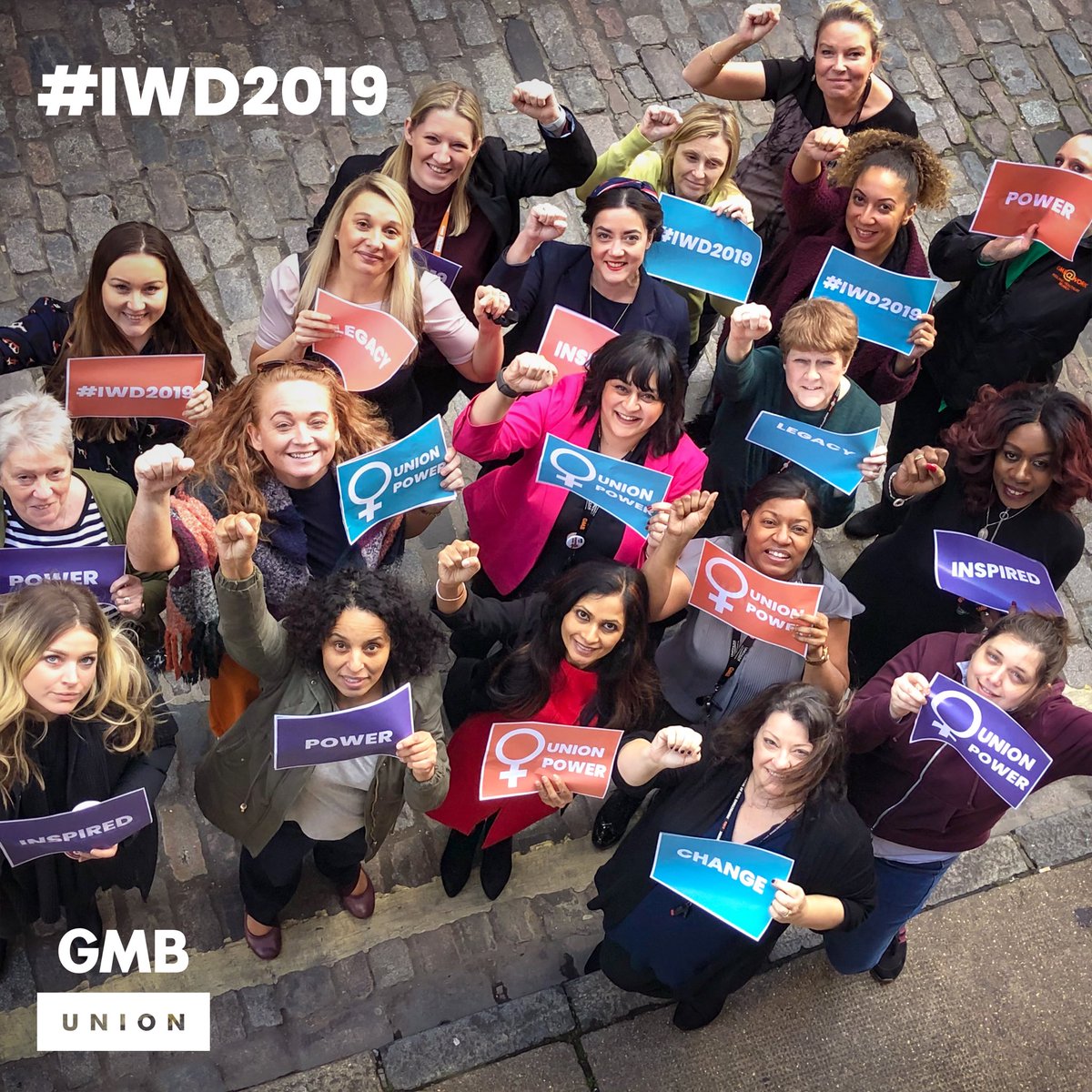
International Women's Day, March 8, is the day when women nationally and internationally affirm their being, and pledge that they will continue to fight for their rights and the rights of all, and step up their conviction to say No! to everything that is not in their name.
All over the world women shoulder the brunt of the anti-social offensive and the neo-liberal agenda. They are at the forefront of opposing imperialist aggression and war and striving to establish anti-war governments, turning things around in favour of the people.
Not only that, but in the fight for empowerment, women are also at the forefront of taking up this perspective in the people's struggles. They are rejecting that women are fair game, and are everywhere militantly taking up responsibility for the fate of society, the right to conscience and for social justice. They are working for solutions, upholding the rights of all women, including those incarcerated in immigrant detention centres, and will not be reconciled to the mantra that the issue is simply one of correcting gross inequalities, finding the right balance or that the ruling elite should be more transparent.
It is clear, therefore, what a powerful and irresistible force are women and their struggles everywhere. As the going gets tougher, the collectives of women get more inspired, take up more positions of leadership in the movements of the people, and affirm the vision of a new world of socialised humanity.
Congratulations to women everywhere on this International Women's Day 2019.
Never has it been more true that women are at the front and centre of the struggle to emancipate society from its current state of crisis whilst at the same time fighting to safeguard the future of society and bring the new into being. It was in this spirit of organising for the new that on March 8, 2019, a number of women got together to celebrate International Women's Day in London.
It was decided that everyone would bring poems and music written by and about women, with the main theme being to join together to speak In Our Own Name. Many poems and songs were presented. Two in particular - one poem and one song - gave voice to the tremendous spirit of the whole event and get-together. These included the poem "Search For My Tongue" by the Gujarati poet, Sujata Bhatt, and "Ella's Song" as rendered by the group Sweet Honey in the Rock.
"Search For My Tongue" eloquently expresses what it is like for anyone trying to live, survive and express themselves in a land which is not their country of origin, having their own customs and language. And in the country in which they find themselves or that they have made home, their voices are often suppressed or are counted as nothing or criminalised.
"Ella's Song" was written to honour the Civil Rights activist, Ella Baker (1903-1986) who was an instrument for teaching others to stand up and fight for their rights and for the rights of all. The lyrics and music were written by Bernice Johnson Reagon and then the song was taken up and popularised by Sweet Honey in the Rock, an African-American female a cappella group. Its final verse loudly proclaims the importance for women of finding and speaking in our own name: "I'm a woman who speaks in a voice and I must be heard."
At their best, they show that women will not be relegated to the margins of society but that they are in fact at the forefront of struggles being waged throughout society. So the evening proved to be an affirming occasion. It was uplifting and encouraging, and a fitting way to honour and celebrate International Women's Day.
Search For My Tongue by Sujata Bhatt
You ask me what I mean
by saying I have lost my tongue.
I ask you, what would you do
if you had two tongues in your mouth,
and lost the first one, the mother tongue,
and could not really know the other,
the foreign tongue.
You could not use them both together
even if you thought that way.
And if you lived in a place you had to
speak a foreign tongue,
your mother tongue would rot,
rot and die in your mouth
until you had to spit it out.
I thought I spit it out
but overnight while I dream,
munay hutoo kay aakhee jeebh aakhee bhasha
may thoonky nakhi chay
parantoo rattray svupnama mari bhasha pachi aavay chay
foolnee jaim mari bhasha nmari jeebh
modhama kheelay chay
fullnee jaim mari bhasha mari jeebh
modhama pakay chay
it grows back, a stump of a shoot
grows longer, grows moist, grows strong veins,
it ties the other tongue in knots,
the bud opens, the bud opens in my mouth,
it pushes the other tongue aside.
Every time I think I've forgotten,
I think I've lost the mother tongue,
it blossoms out of my mouth.
Janice Murray, TML Weekly Information Project
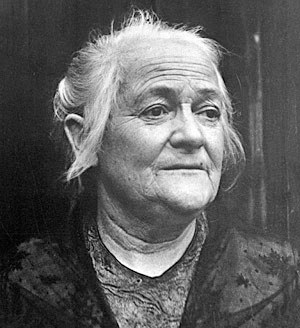
German communist Clara Zetkin (1857-1933), initially
proposed International Women's Day in 1910. She was active in the Social
Democratic Party of Germany until 1916, when she co-founded the Spartacus
League of the Independent Social Democratic Party of Germany. In 1919 she
joined the Communist Party of Germany, which she represented in the Reichstag
from 1920-1933.
In 1910, 109 years ago, a resolution was passed by the Second International Conference of Socialist Women held in Copenhagen, Denmark establishing International Women's Day. More than 100 women delegates from 17 countries attended, among whom were the first three women elected to the Finnish parliament. The resolution was put forward by German communist Clara Zetkin who had first proposed the idea of an annual demonstration in support of working women and women's rights at the First International Conference of Socialist Women held in Stuttgart, Germany in 1907.
This Second International Conference of Socialist Women reiterated the principles adopted at the First on the question of women's suffrage. These principles established the framework for the resolution to establish an International Women's Day that focused on the question of women's political rights.
The document states in part:
"The socialist woman's movement of all countries repudiates the limited Woman's Suffrage as a falsification of and insult to the principle of the political equality of the female sex. It fights for the only living concrete expression of this principle: the universal woman's suffrage which is open to all adults and bound by no conditions of property, payment of taxes, or degrees of education or any other qualifications, which exclude members of the working class from the enjoyment of the right. They carry on their struggle not in alliance with the bourgeois Women's Righters, but in alliance with the Socialist Parties, and these fight for Woman's Suffrage as one of the demands which from the point of view of principle and practice is most important for the democratisation of the suffrage."
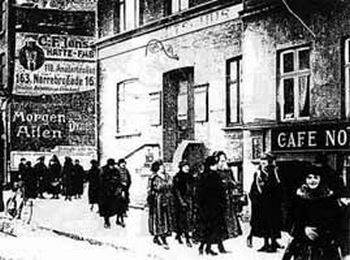
Historic site in Copenhagen, Denmark where women from
around the world gathered for the Second International Conference of Socialist
Women in 1910 and passed the resolution establishing International Women's
Day.
Stating that the socialist parties in all countries are "bound to fight with energy for the introduction of Woman's Suffrage" it says that the socialist women's movement must take part in the struggles organised by the socialist parties for the democratisation of the suffrage, while at the same time ensuring that within this fight the "question of the Universal Woman Suffrage is insisted upon with due regard to its importance of principle and practice."
The resolution to establish International Women's Day states,
"In order to forward political enfranchisement of women it is the duty of the Socialist women of all countries to agitate according to the above-named principles indefatigably among the labouring masses; enlighten them by discourses and literature about the social necessity and importance of the political emancipation of the female sex and use therefore every opportunity of doing so. For that propaganda they have to make the most especially of elections to all sorts of political and public bodies."
The delegates resolved,
"In agreement with the class-conscious political and trade organisations of the proletariat in their country the socialist women of all nationalities have to organise a special Woman's Day, which in first line has to promote Women Suffrage propaganda. This demand must be discussed in connection with the whole women's question according to the socialist conception of social things."

Second International Conference of Socialist Women in
1910
A "Woman's Day" had been organised the previous year in the United States, on the last Sunday in February 1909, by the National Women's Committee of the American Socialist Party. It was marked by demonstrations which highlight the demand for women's suffrage along with the rights of women workers, particularly in the garment trade. Woman's Day honoured the thousands of women involved in the numerous labour strikes in the first years of the twentieth century in many cities, including Montreal, Chicago, Philadelphia and New York. This was a period when women entered the labour force in their thousands and alongside working men fought to organise collectively and to improve their brutal conditions of work.
Later in 1909, needle-trade workers in New York City - 80 percent of whom were women - walked off their jobs and marched and rallied for union rights, decent wages and working conditions in the "Uprising of 20,000." The work stoppage was referred to as the "women's movement strike" and continued from November 22, 1909 to February 15, 1910. The Women's Trade Union League provided bail money for arrested strikers and large sums for strike funds during the work stoppage.
Early Celebrations of International Women's Day
March 19, 1911 was the date set for the first International Women's Day and, implementing the resolution adopted at the Second International Conference of Socialist Women, rallies were held in Austria, Denmark, Germany and Switzerland on that day attended by more than one million women and men. "The vote for women will unite our strength in the struggle for socialism" was the call of these rallies. In addition to their demand for the right to elect and be elected, they demanded the right to work, to vocational training and to an end to discrimination on the job. A woman socialist wrote at that time:
"The first International Women's Day took place in 1911. Its success exceeded all expectation. Germany and Austria on Working Women's Day was one seething, trembling sea of women. Meetings were organised everywhere - in the small towns and even in the villages halls were packed so full that they had to ask male workers to give up their places for the women.
"This was certainly the first show of militancy by the working woman. Men stayed at home with their children for a change, and their wives, the captive housewives, went to meetings. During the largest street demonstrations, in which 30,000 were taking part, the police decided to remove the demonstrators' banners: the women workers made a stand. In the scuffle that followed, bloodshed was averted only with the help of the socialist deputies in Parliament."
The following year, women in France, the Netherlands and Sweden joined in actions marking International Women's Day. In the period leading up to the declaration of World War I, the celebration of International Women's Day opposed imperialist war and expressed solidarity between working women of different lands in opposition to the national chauvinist hysteria of the ruling circles. For example, in Europe International Women's Day was an occasion when speakers from one country would be sent to another to deliver greetings.
Russian women observed their first International Women's Day on the last Sunday in February 1913 (on the Julian calendar, which corresponded to March 8 on the Gregorian calendar in use elsewhere), under conditions of brutal Tsarist reaction. There was no possibility of women organising open demonstrations but, led by communist women, they found ways to celebrate the day. Articles on International Women's Day were published in the two legal workers' newspapers of the time, including greetings from Clara Zetkin and others.
An essay written in 1920 by a woman communist activist at that time described the 1913 celebration:
"In those bleak years meetings were forbidden. But in Petrograd, at the Kalashaikovsky Exchange, those women workers who belonged to the Party organised a public forum on 'The Woman Question.' Entrance was five kopecks. This was an illegal meeting but the hall was absolutely packed. Members of the Party spoke. But this animated 'closed' meeting had hardly finished when the police, alarmed at such proceedings, intervened and arrested many of the speakers.
"It was of great significance for the workers of the world that the women of Russia, who lived under Tsarist repression, should join in and somehow manage to acknowledge with actions International Women's Day. This was a welcome sign that Russia was waking up and the Tsarist prisons and gallows were powerless to kill the workers' spirit of struggle and protest."
Women in Russia continued to celebrate International Women's Day in various ways over the ensuing years. Many involved in organising landed themselves in Tsarist prisons as the slogan "for the working women's vote" had become an open call for the overthrow of the Tsarist autocracy.
The first issue of "The Woman Worker" (Rabotnitsa), a journal for working class women, was published in 1914. That same year, the Bolshevik Central Committee decided to create a special committee to organise meetings for International Women's Day. These meetings were held in the factories and public places to discuss issues related to women's oppression and to elect representatives from those who had participated in these discussions and the resulting proposals to work on the new committee.
International Women's Day 1917 in Russia
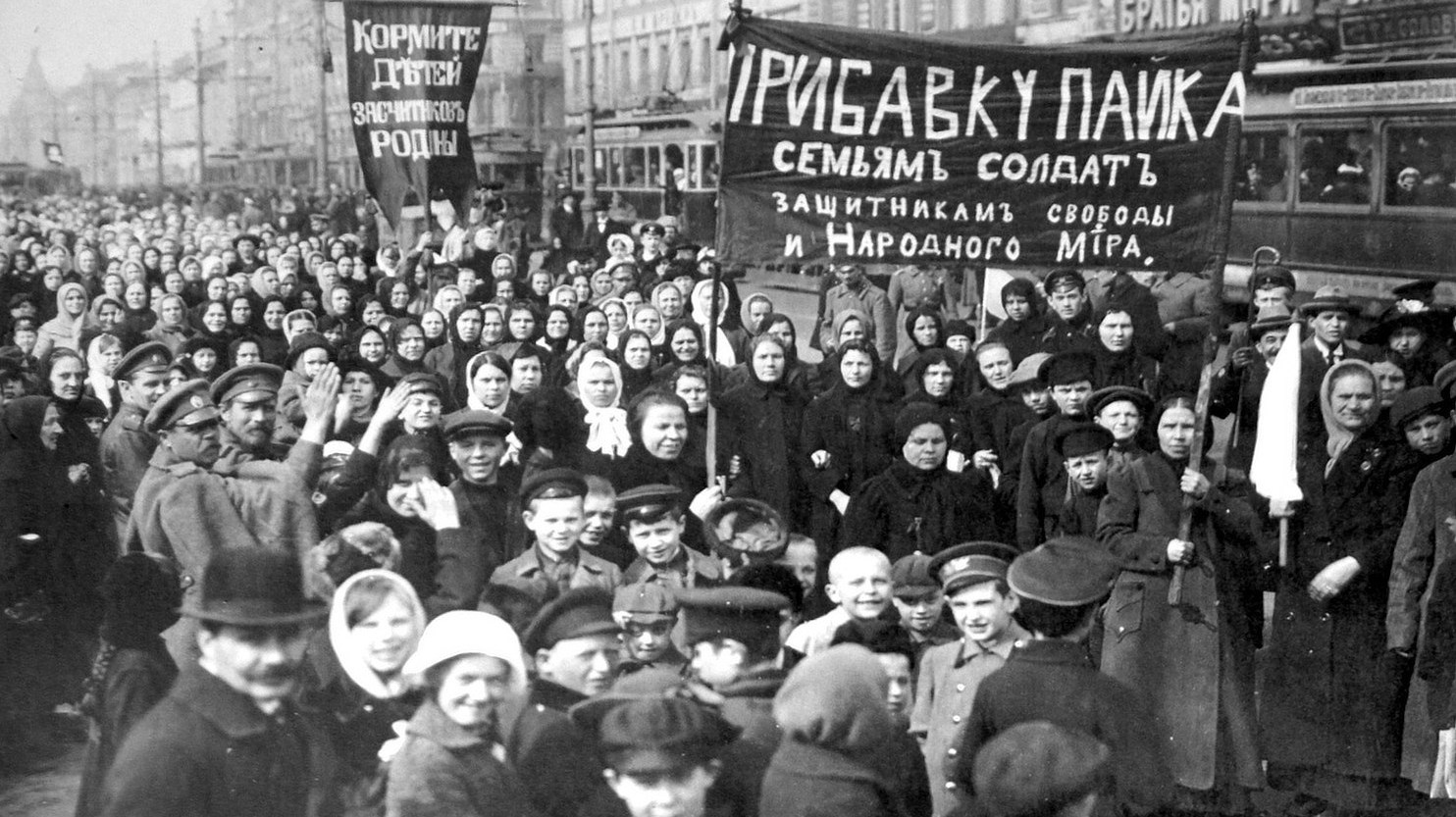
International Women's Day demonstration in 1917 at the
Putilov factory in Petrograd.
In Russia, International Women's Day 1917 was a time of intense struggle against the Tsarist regime. Workers, including women workers in textile and metal working industries, were on strike in the capital city and opposition to Russia's participation in the imperialist war raging in Europe was growing. On March 8 (February 23 on the Julian calendar), women in their thousands poured onto the streets of St. Petersburg in a strike for bread and peace. The women factory workers, joined by wives of soldiers and other women, demanded, "Bread for our children" and "The return of our husbands from the trenches." This day marked the beginning of the February Revolution, which led to the abdication of the Tsar and the establishment of a provisional government.
The provisional government made the franchise universal, and recognised equal rights for women. Following the October 1917 Revolution, the Bolshevik government implemented more advanced legislation, guaranteeing in the workplaces the right of women to directly participate in social and political activity, eliminating all formal and concrete obstacles which previously had meant the subordination of their social and political activity and their subservience to men. New legislation on maternity and health insurance was proposed and approved in December 1917. A public insurance fund was created, with no deductions from workers wages, that benefited both women workers and male workers' wives. It meant that women were now treated second to none as neither they nor their children were dependent on spouses and fathers for their well-being.
After 1917
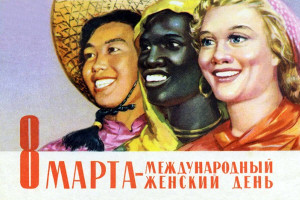
March 8 as International Women's Day became official in 1921 when Bulgarian women attending the International Women's Secretariat of the Communist International proposed a motion that it be uniformly celebrated around the world on this day. March 8 was chosen to honour the role played by the Russian women in the revolution in their country, and through their actions, in the struggle of women for their emancipation internationally.
The first IWD rally in Australia was held in 1928. It was organised by the communist women there and demanded an eight hour day, equal pay for equal work, paid annual leave and a living wage for the unemployed.
Spanish women demonstrated against the fascist forces of General Francisco Franco to mark International Women's Day in 1937. Italian women marked IWD in 1943 with militant protests against fascist dictator Benito Mussolini for sending their sons to die in World War II.

Posters of the Soviet Union
In this way, since 1917, International Women's Day has been both a day of celebration of women's fight for their rights and the rights of all and a day to militantly reaffirm the fight for women's rights which continues to this day and opposition of women to imperialist war and aggression. Its spirit has always been that to win the rights of women and the fight for security and peace, women must put themselves in the front ranks of the fight and of governments which represent these demands.
Theresa May has been humiliated by Brussels, humiliated by her MPs, even her Cabinet, as she grimly ploughs on with the fated Withdrawal Agreement.
What choice does she have? It looks like this time, June will indeed be the end of May.
Bribery has got her nowhere, pleading with the EU has got her nowhere, promises of workers' rights have got her nowhere, even going to Grimsby and giving a long speech seems to have got her nowhere.
There is very little more kicking the can down the road, which some have said she has turned into an art-form, that she can do, as the end of the road looms, and no-one wants the can.
In other words, she has run out of moves. If she does somehow find another move, chances are that it will only further exacerbate the crisis.
The crucial issue facing the working class and people, the over-riding perspective, is that of changing the direction of the economy and of society as a whole. Parliament, in the shape of representative democracy, has demonstrated that it cannot sort out the different interests within the ruling elite, and the situation therefore becomes even more dire for the working people in terms of the anti-social offensive where the private vested interests are at war with each other.
It confirms, not that another referendum is required with the same terms of the previous one, but that the working class needs its own independent political agenda and programme that it fights for, providing society with an outlook that favours the people as a whole. The working people urgently need their own empowerment.

BMW, along with Toyota, Ford and Aston Martin, have stepped up the pressure coming from large multinational car manufacturers to influence developments regarding what kind of deal is or is not to be established with the EU after Brexit. The industry as a whole has become increasingly vocal over no deal as the March 29 deadline approaches.
In a political intervention, BMW declared this week that a no-deal could mean it ends production of the iconic Mini in Britain, moving it elsewhere in Europe.
Speaking to Sky News, BMW board member Peter Schwarzenbauer said if a "worst case" no-deal scenario happened, "we would need to consider what it exactly means for us in the long run".
"For Mini, this is really a danger," he added.
Asked if BMW could move Mini production out of Cowley near Oxford, he said: "We at least have to consider it."
Earlier, BMW chief executive Harold Krueger told the BBC that the carmaker was preparing "for a lot of scenarios" and was "very flexible" in its approach to production.
Likewise, van Zyl, head of European operations for Japanese multinational Toyota, said no deal could put at risk future investment in its Burnaston plant near Derby, where the firm employs 2,500 people.
He said it was vital that there was frictionless trade with the EU, the loss of which would block the company from constantly improving competitiveness.
Aston Martin's chief executive Andy Palmer this week talked of "a bloodbath" for the industry, while Ford warned that leaving without a deal would be "catastrophic". The body that represents the British motor industry, the Society of Motor Manufacturers and Traders (SMMT), said investment had already been hit.
Neither are brinkmanship, imposition and intransigence on the part of the British government and EU nor fearmongering and threat-making on the part of big business any way to conduct international relations and trading arrangements.
The Mini brand has long since ceased to be a "British car". The Mini is built with steering wheels from Romania, headlights from Spain, rear lights from Poland and the crankshaft is from France. These components go to and fro between countries in a series of "just-in-time" transits. The monopolies demand arrangements that allow them to operate in this way with the motive of maximising profits according to the state of competition and considerations such as wages and government claims in various countries. The shifting conditions create their own contradictions and result, for example, in the argument for consolidating production at a single point. The monopolies also demand arrangements that facilitate them moving production wholesale from one country to another at will. Their considerations and the arrangements they create have nothing to do with establishing a system of trade and international relations based on mutual benefit and the needs of the interconnected socialised economies of individual countries and the world as a whole.
The question has to be asked: What right have BMW to move the production of the Mini elsewhere without consideration of the workers, region and the economy as a whole?
The demand should be that production continues in Oxford. Why should global business interests dictate? These businesses are powerful monopolies who demand arrangements that enable them to act at will. There is a real danger in workers becoming nonplussed at such rapid and damaging developments. On the one hand, the view is fostered that the issue is to just "get on with it" over Brexit, while on the other, divisions are entrenched and reaction and chauvinism are promoted. Either way, the level of politics is degraded to the lowest depths. Instead, the workers demand a say and to have control over matters that affect their lives, and the situation is such that their independent politics is what is missing and so desperately required.
No dictate from BMW!

Production of Wonderland at the Northern Stage,
Newcastle
The play Wonderland, which had previously been staged in London in 2014 and had a very successful regional premier at the Nottingham Playhouse in 2018, has just had its second run this year, starting in February in Nottingham and finishing in Newcastle-upon-Tyne. That March this year marked the 35th anniversary of the start of the 1984-85 miners' strike was a major draw to the large audiences that attended the play's run at the Northern Stage in Newcastle between February 27 and March 9. Following the play at one performance, a representative of the Durham Miners' Association led a question and answer session with the actors and audience.
This powerful production, featuring wonderful acting and song and a brilliant stage production, was written by Beth Steel and directed by Adam Penford. The play is set at the Welbeck Colliery in Nottingham, where many of the miners had come and settled from the North East coalfields as a result of pit closures in the 1960s in the Durham area.
Writing in the programme about the play's revival this year, Penford said: "Although the action takes place 35 years ago, a lot of the politics resonate with contemporary society and I suspect different characters, moments and lines will ring out with increased familiarity and power."
As the director says, "you are from the opening scene thrust into this underground world" and the baptism of fire of two young apprentice miners with one of the coal face gangs. The coarse comments underground are tempered by the growing comradeship needed to cope with the ever-present dangers and the heat in the mine. In this early part of the play, the miners sing movingly about their life underground and their history of struggle.
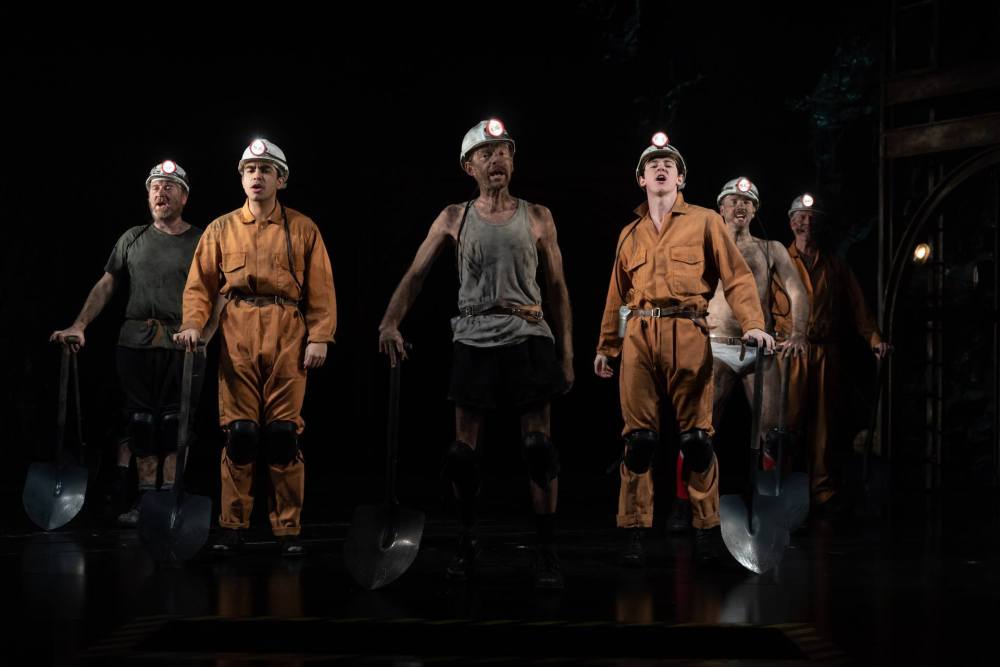
As the story unfolds, the miners go through a second baptism of fire as they launch their strike and fight to maintain it against the full force of the state. In these scenes the singing stops, adding to the force of the arguments the miners give to defend their strike, the union and its leadership and conveying a sense of what the dignity of labour really means: not just the dignity of hard work in the mine, but of taking responsibility to defend their interests as part of the fight to defend society as a whole against the all-sided attack on it by the ruling class. The writer does not hold back from showing that both before the strike starts and as the strike progresses, the embattled miners suffer huge hardships. The play shows how each miner tries to cope with this, attempting to protect their livelihood and their families.
The story also depicts the real characters of the time in the government and state apparatus, with their outlook of privatisation and their obsession with defeating the miners. Representing the unfettered interests of the financial elite, these characters want to break the resistance of the working class and to transform the crisis-ridden state-owned system into a source of huge profits for themselves, regardless of the costs to the working class and people and to their future. In these scenes, the play draws people back to the miners' strike, because today these consequences are being felt with every passing year, as the productive forces are destroyed and as assets such as public services suffer the consequences of the anti-social offensive.
Whilst their outlook is to disempower the miners, with a plan to defeat them within six months, the representatives of the rich cannot agree and fight among themselves on how to win. During the strike, even Ian MacGregor - the American CEO known as the butcher - tie all askew and running out of coal stocks at the power stations - wants to negotiate a settlement with the miners after six months. But the criminal outlook of Thatcher and the ideologues of the British state to defeat the miners at all costs is revealed.

Miners defending themselves against the state organised
attack on their mass picket at Orgreave.
The play reveals the plan of the state forces for a showdown at Orgreave, five months after the start of the strike. They try to smash the strength of the miners' pickets in one place using, police, police cavalry and the army. The playwright's research also reveals how this was done in some detail. No wonder the present government refuses to expose the truth of Orgreave as ex-miners and organised labour are presently demanding.
As the state-organised police units and army are increasingly brought to bear against the miners and mining villages, stopping people moving around the country, the resilience and maturing of the outlook of the miners and their communities is revealed by the play. In spite of the painful setbacks and tragedies, they continue the strike beyond the six months with the women playing an increasingly vital role to the whole struggle through the harsh winter until the strike ends after a full year.
At the conclusion of the play, the sense of the dignity and the new maturity at the end of the strike shines through. Risking their own lives the gang rescue from a rock fall a young strike-breaker who had gone back after eleven months. In this final scene, these miners have the last word, revealing the legacy of this strike today in their communities. They have not gone away because of the defeat of the strike. No, they are here with us in the fight for the new society we all desire.
Receive Workers'
Weekly E-mail Edition: It
is free to subscribe to the e-mail edition
We encourage all those who support the work of RCPB(ML) to also support it
financially:
Donate to
RCPB(ML)
Workers' Weekly is the weekly on
line newspaper of the
Revolutionary Communist Party of Britain (Marxist-Leninist)
Website:
http://www.rcpbml.org.uk
E-mail:
office@rcpbml.org.uk
170, Wandsworth Road, London, SW8 2LA.
Phone: 020 7627 0599: